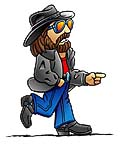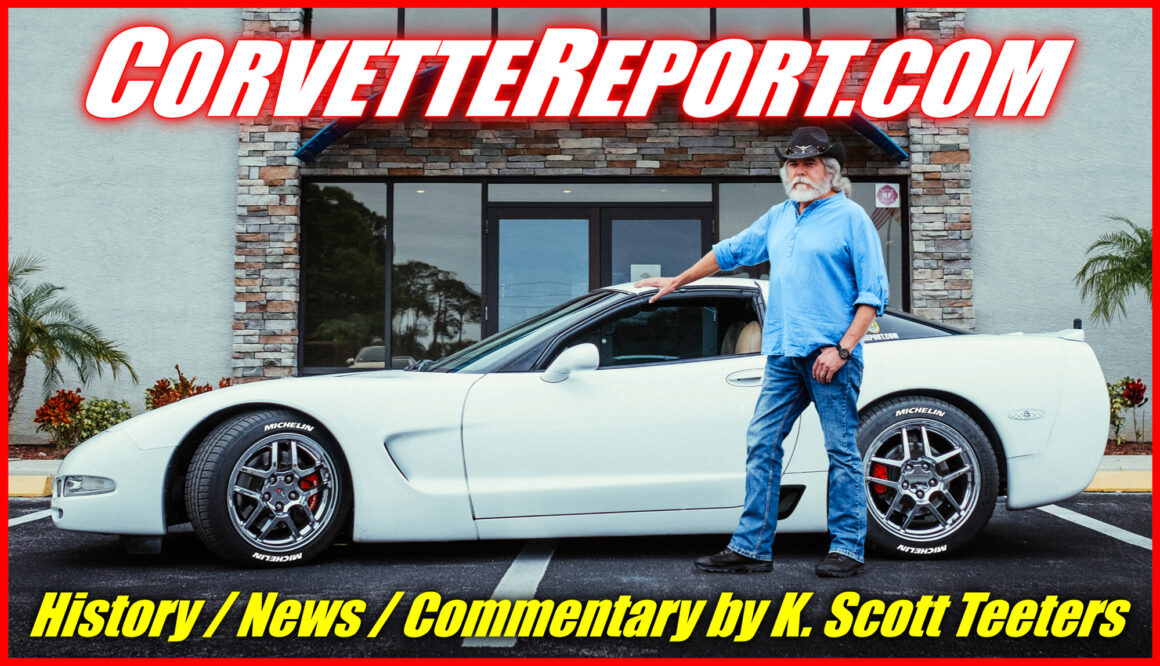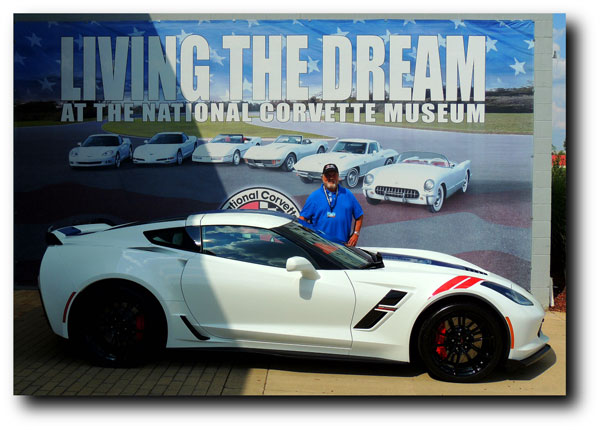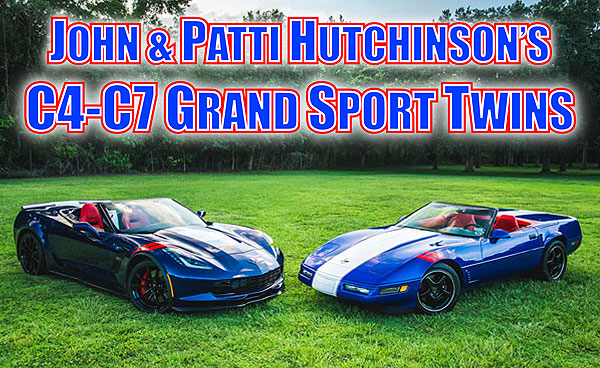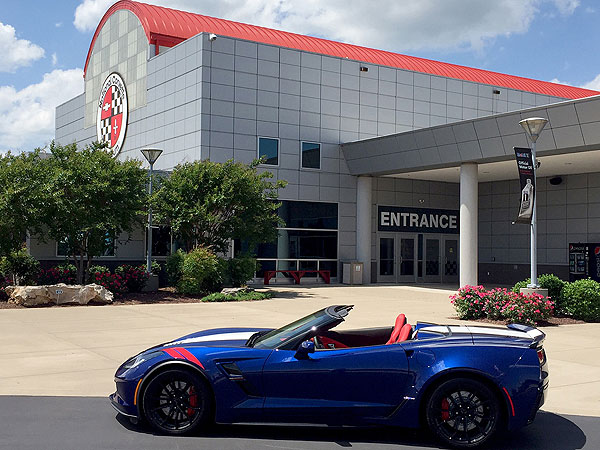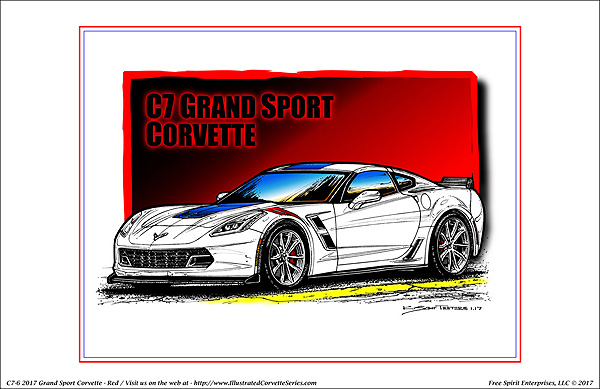A loving tribute to a brother, a husband, a father, a hero, and the very first production Z06 Corvette Sting Ray racecar
We all have “defining moments” in our life. You know, those rare moments that can happen in an otherwise ordinary day that changes the course and direction of your life. It could be the day the prettiest girl in class “smiles that smile” that makes you forever a softie for blonds. Or, like for me, the day I saw a 1965 Corvette Sting Ray Coupe at a Chevrolet dealership and a salesman gave me a brochure with technical line art that helped set me on my life course.
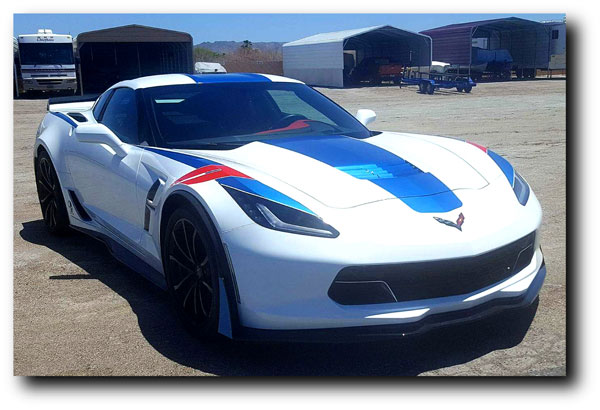
In late September 1962, 16-year-old Doug MacDonald had such a defining moment. Doug’s big brother was road racing legend and 2014 National Corvette Museum Hall of Fame Inductee, Dave MacDonald. When your brother is eleven years older than you, while you are growing up, your perception is that your sibling is “one of the adults.” In 1960, Dave MacDonald started racing a 1957 Corvette when he was 23 years old and Doug was only 13, so the best Doug could do was hang around on the sidelines, take in as much as he could understand, and do his best to stay out of the way!
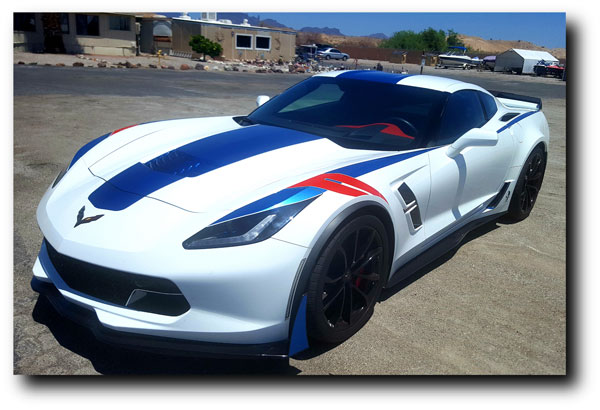
Dave MacDonald was one of a group of Southern California guys that were Zora Arkus-Duntov’s favorite people – young men that raced their Corvettes. These were the burgeoning years of the California car culture. What’a time to be a young man with a driver’s license and a knack for mechanics! Dave had a job at Don Steves Chevrolet and formed a friendship with salesman Jim Simpson. Together the young fellows bought a beat-up 1957 Corvette and built a racecar. Simpson helped get a small sponsorship from their employer and the two lads were off to the races.
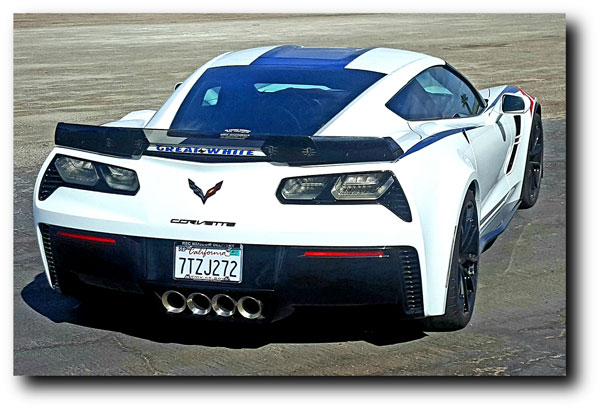
The Dave MacDonald story is now legendary and I have covered Dave MacDonald’s amazing but short career in the October 2012 issue of Vette Vues. Dave was a natural and taught himself to drive racecars via the school of trial and error. It didn’t take too long before crowds started to notice MacDonald’s “tail out” driving style and quickly nick-named the young man, “The Master of Oversteer.” (Dave would have LOVED modern “Drifting” racing!)
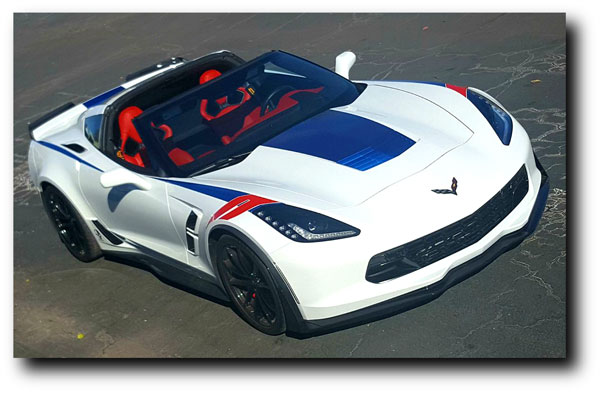
What most of the young fellows that were honing their skills on the SoCal racetracks didn’t know was that important and powerful men in the racing and manufacturing were closely watching the amateur-racing scene, looking for talent. As MacDonald kept racking up an impressive string of wins, two of the most powerful men in manufacturing and racing were following Dave very closely – Zora Arkus-Duntov and Carroll Shelby.
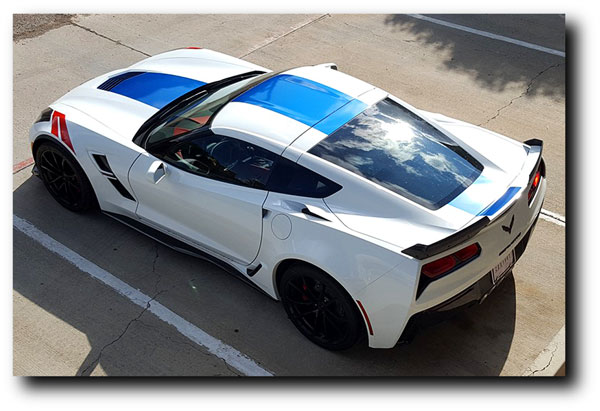
MacDonald’s rookie year was 1960 when he took five 1st place wins out of 18 races – a 27% victory rate! The following year in 1961, Dave drove the Don Steves Corvette to 15, 1st place wins out of 25 races – a 60% victory rate. From January to April 1961 Dave and Jim won the first nine races. For the season, the guys only had three 2nd place finishes and five “DNF” (Did Not Finish), and one “DNS” (Did Not Start) race. One DNF race was with their all-new, Max & Ina Balchowsky purpose-built 1961 Corvette.
The purpose-built Balchowsky Corvette happened because one day at the track, Carroll Shelby told Dave and Jim that to take their racing to the next level, they should get a Balchowsky purpose-built car. “Purpose-built” racecars were hand fabricated, tube chassis cars with hand-made, lightweight fiberglass silhouette replica bodies. Think prehistoric tube frame Trans-Am cars. Balchowsky’s 1959 “Old Yeller II” was already a legend, so Max and his wife Ina were the “go-to” couple for competitive hand-made racecars.
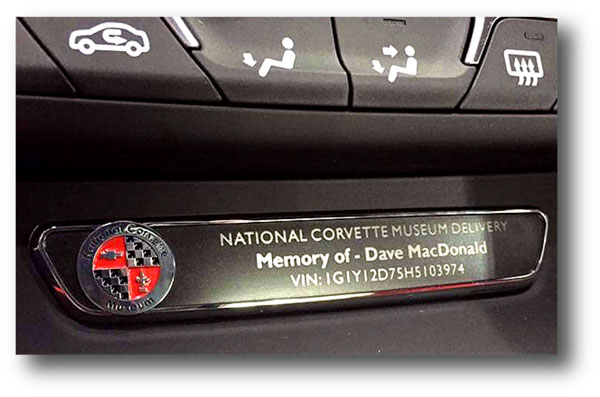
When word got out that MacDonald and Simpson were building a tube frame Corvette, it got the attention of Mr. Duntov because he too was thinking about building a tube frame Corvette, but with the body of the upcoming new 1963 Sting Ray. Yes, we’re talking about the Grand Sport Corvette during its larva stage. One day, when Duntov was in the Los Angeles area, he stopped by MacDonald’s house for a visit and to check out what Dave and Jim were up to!
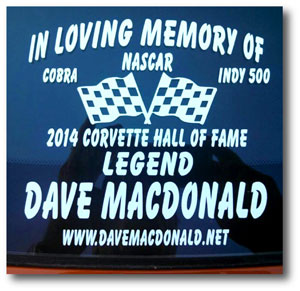
Doug MacDonald was just 14 years old then and recalled, “Mr. Duntov’s accent was so thick, I couldn’t understand much of what he said. Somehow, Zora and Dave understood each other enough, but I was completely lost.” A bond of racer’s respect was forged and Duntov would later put Dave to work for some interesting “field testing” opportunities. The 1,750-pound purpose-built car, now called the, “1961 Corvette Special”, was powered by a mildly modified 327 Fuelie, and had tremendous potential. Dave and Jim now had two cars they were campaigning on a small budget, despite the Don Steves Chevrolet sponsorship.
From October 1961 to May 1961 Dave and Jim raced the 1961 Corvette Special in eight races, taking four 1st place wins! But a close examination of the points standings showed that Dave and Jim had a better chance of a championship racing with their stock-based Corvette racer. So, the 1961 Corvette Special was sidelined. Both young men were gunning for a championship!
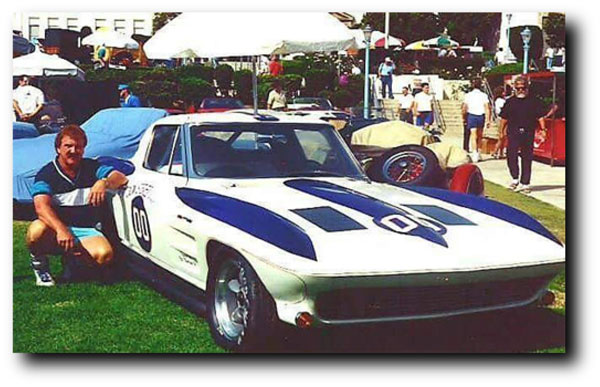
But Duntov’s meeting with MacDonald made a powerful impression on the Corvette chief engineer. By the summer of 1962 when preproduction Corvettes were ready for some promotional track testing, MacDonald and Dr. Dick Thompson were invited to a sampling. From June 29 to July 2, 1962, Chevrolet produced a promotional film with MacDonald and Thomson driving a ‘63 Coupe and Roadster at the GM test track. After a few laps, Mr. Duntov interviewed the drivers. The promotional film is titled, “Biography of a Sports Car” and fortunately is on YouTube. The television commercial for the then-new 1963 Corvette Sting Ray has footage of Dick Thompson and Dave MacDonald driving a coupe and convertible at the test track. This too is on YouTube.com.
A few weeks later, Duntov flew Dave and Sherry, Jerry Grant, and Bob Bondurant out to St. Louis to pick up three of Duntov’s latest “racer kit” Z06 Corvettes. Chevrolet brass decided to give Dave Z06 #1! That’s right, the Don Steves Chevrolet Z06 Corvette racecar is the first “official” Z06 to roll off the assembly line! Jerry Grant drove his Sting Ray out to Washington state, while Dave and Bob drove their cars to California.
Dave and Sherry loaded their suitcases in the back of the Sting Ray and headed west. Dave actually liked his lady driving a hot car. Sherry recounts, “A lot of times if I was driving one of our Corvettes, Dave was always telling me, “Drive faster, drive faster!” Do you think the MacDonalds opened up the Z06 on the way home from St. Louis? Sherry remembers seeing the speedometer pegged at over 140-mph! But the Z06 wasn’t their personal car; it was scheduled to become a racecar. The MacDonald’s would soon purchase a new Sting Ray as their personal car; a Riverside Red 1963 Fuel Injected Sting Ray Coupe with 4.11:1 gears, 4-speed, and power windows. Yes, it was very quick.
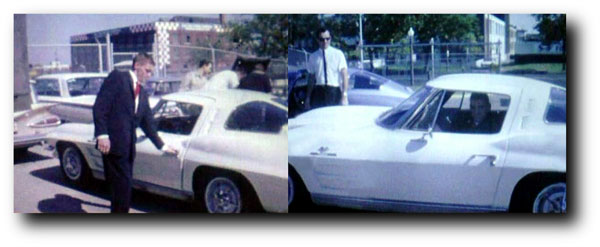
Meanwhile, back at home; Doug MacDonald could not have been more stoked! His big brother/hero was being flown around the country with all expenses paid by Duntov and Chevrolet. Dave was track testing preproduction Corvettes for Zora and now was one of four select racers (Dave, Jerry Grant, Bob Bondurant, and Mickey Thompson), personally invited by Duntov himself, to take delivery of what was supposed to be Zora’s secret weapon for his Corvette racer customers, RPO Z06. The all-new Sting Ray with its much-improved frame, structure, chassis, and Fuel Injected 327 was now available with a special suspension and brakes package that was designed for victory.
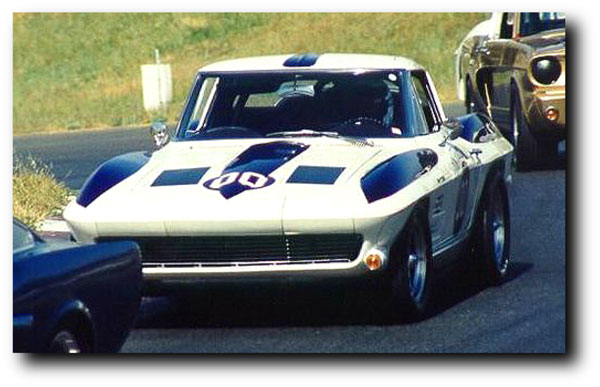
The long trip home was designed to break in the Z06 so that by the time the cars arrived in California, they could be prepped for the L.A. Times 5th Annual Grand Prix Race at Riverside 3-Hour Enduro in October. Doug’s big brother Dave and sister-in-law Sherry were driving the new Z06 home from St. Louis where the car had just rolled off the assembly line. This was VERY heady stuff for a 15-year-old kid!
Phone calls along the way kept the MacDonald family apprised of the trip home. When Dave and Sherry got off the freeway and called home, what they didn’t know was that they had company. “New Cars” were hyped back then, but not like they are today. Think for a moment what cars looked like in 1962, and then hold in mind the images of a 1963 Corvette Sting Ray Split-Window Coupe. There was NOTHING like it. The new Sting Ray looked like “the automobile from another planet!” Buck Rogers and George Jetson didn’t even have rides this cool!
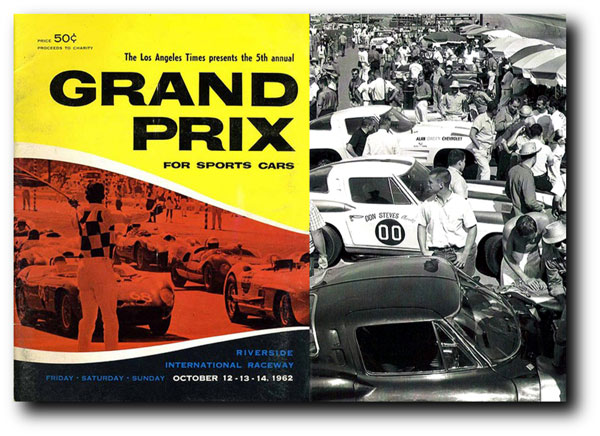
Doug was waiting outside of his parent’s home when Dave and Sherry turned the corner of their street. Doug recalls, “I could not believe what I saw. The bright white Sting Ray was the most beautiful thing I had ever seen in my life! But as the car turned the corner of our street, a dozen or more other cars were following Dave and Sherry – and we didn’t live on a busy street. These people followed Dave and Sherry off the freeway and to our house because they wanted to see this stunning new Corvette! I’ll never forget it. We were all stunned!” The scene was forever burned into Doug’s memory and 54-plus years later, Doug MacDonald would be driving his own white Corvette Stingray, with a special purpose in mind.
With less than three weeks before the L.A. Times 5th Annual Grand Prix 3-Hour Enduro race, Dave and Bill Thomas (Mr. Cheetah) got as much done to prep the car as they could. Modifications were limited to rebuilding the engine, installing side exhaust, adding a roll bar, and removal of the bumpers. The Sting Ray’s fender humps and hood bulge were painted blue with red pin striping and “Don Steves Chevrolet” and MacDonald’s “00” lettering was added.
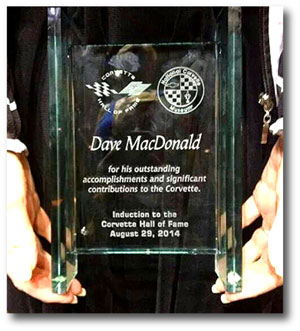
Anything can go wrong in an endurance race, even the simplest things. The biggest challenge to the new Corvettes was Shelby’s new Cobra that weighed 1,100-pounds less than the 3,100-pound Corvettes. In the first hour of the race, hard-charging MacDonald fought Billy Krause, driving the Cobra. Just before the end of the first hour, within minutes of one another, the driver’s side rear wheel of MacDonald’s Z06 came off (likely due to one or more loose lug nuts), then Krauss’ Cobra broke a rear axle. Later in the second hour, the engines in the Bondurant and Grant cars let go, leaving Doug Hooper, driving the Thompson Z06 to win the race.
Thompson, ever the showman, proclaimed, “I don’t think its ever been done before! A new production car winning the first time out.” While a “win is a win,” it was a default win because Corvettes would be chasing after Cobras until Duntov’s L88 arrived in 1967. Ironically this was the last time MacDonald ever professionally raced a Corvette. By the end of 1962, Carroll Shelby offered Dave a golden opportunity as a full-time driver. The Don Steves Corvette was raced a little, but nothing serious. The car has since been beautifully restored and is currently owned by Jim and Nancy Jaeger.
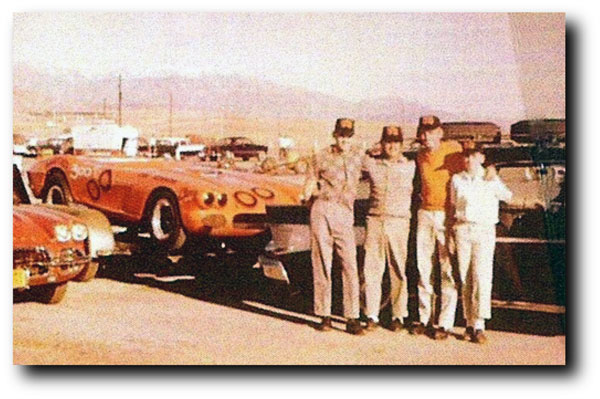
Life often offers up pivotal moments where a single decision can make profound changes. Dave MacDonald’s decision to take Shelby’s offer to professionally drive Cobras took Dave away from the world of Corvettes and into Shelby’s world of beasty Cobras – which Dave loved driving. Not only was MacDonald driving Cobras, he was helping to develop the cars. Dave was also deeply involved in the development of the fastback Cobra Daytona. He was also given the opportunity to race NASCAR stock cars. But back then, just as it is today, the big prize in American racing it to drive and win the Indy 500.
Mickey Thompson was called, “The King of Speed” because he was into anything fast on four wheels and “Sir Mick” wanted an Indy 500 win for his record. Thompson developed a radical, mid-engine Indy racer that was extra low to the ground thanks to its tiny 12-inch tires. The car debuted at the 1963 Indy 500 with mixed results, but after the race, Thompson hired MacDonald to drive for him the following year. But a month later, USAC officials mandated all cars run on 15-inch wheels for future 500s. This was devastating news to Thompson, as the change raised the car’s center of gravity, negated the unique design advantage, and caused the car to lift at speed.
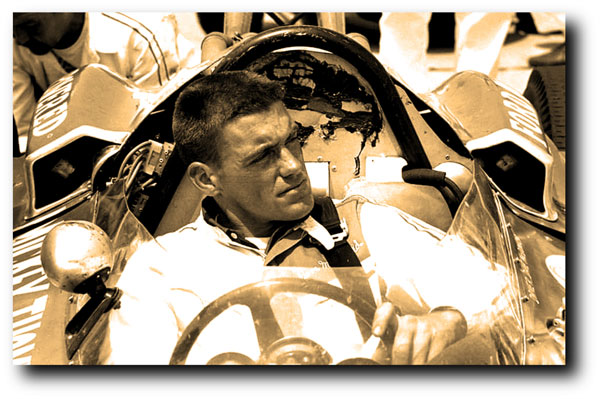
Many of the top drivers of the day track-tested Thompson’s car but passed on driving for Thompson in the 1964 Indy race. However, MacDonald would stay loyal to his friend and not abandon him. Dave also viewed the Indy 500 as a big opportunity and that if he backed out, he’d never be invited back. (probably not so, but it looked that way to Dave) Many drivers questioned his decision. Racing legend Jimmy Clark was track practicing and following MacDonald on Carb Day when Clark pulled off the track after Dave and told him, “Get out of that car mate! Just walk away!” Later, Dave reiterated to Sherry that if he walked away, he’d be branded a “candy-ass”. Even Carroll Shelby tried to get MacDonald to change his mind with the promise of a ride in a really good car for 1965. But Dave’s “word” was his word”.
When the race started, MacDonald, ever the hard-charger, did what he’d always done on a racetrack – charged hard, passing everywhere he could. Racer Johnny Rutherford later reported that MacDonald’s car seemed to be handling badly and he thought, “He’s either gonna win this thing or crash!” At the beginning of the second lap, the Sears-Allstate Special went out of control and crashed, taking the lives of Dave MacDonald and Eddie Sachs.
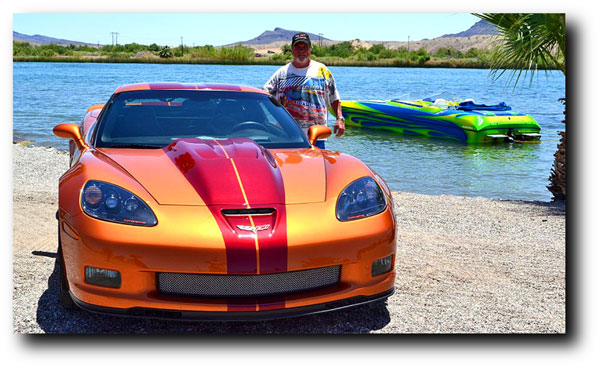
Life for the MacDonald family would never be the same. Doug MacDonald was so overcome with grief and anger that he burned all of the memorabilia he’d collected about his brother’s racing career and he didn’t drive a car for several years. Sherry MacDonald raised their children; Rich and Vicki. After a long investigation, the Indy officials concluded that the crash was caused by the car’s design and there was, “No driver error!” In retrospect, one has to wonder why the car was approved to race in the first place.
But time heals most wounds – sort of.
Doug MacDonald eventually did some racing on his own and for a few years was a driving instructor at the Bob Bondurant Racing School. Over the years, Doug had a few stout Camaros and Corvettes. But for Doug, two things never changed; his passion for Corvettes and the memory of Dave and Sherry driving down his street in that brand new, white 1963 Z06 Corvette Sting Ray. Then in 2009, Doug made the leap into what was then, Chevy’s closest thing to an all-out racing Corvette, the C6 Z06. Doug’s Z06 was Atomic Orange and he added the rear spoiler and aftermarket hood.
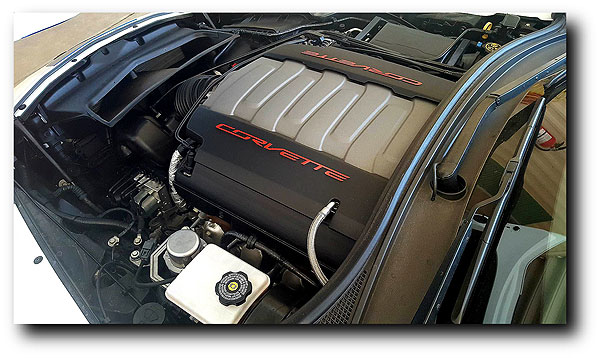
In 2012 Doug had the opportunity to get a previously owned D&D Grand Sport replica. The car was a blast to drive but has its own unique ownership challenges. Grand Sport and Cobra replica cars show us just how rough and brutish the originals truly were. These are not cars that owners tend to drive a lot. They are loud, harsh, and garish. No one takes long trips in them, as they’re not especially comfortable. You can’t go to the store in one because; A. There’s no storage space, and B. You wouldn’t want to leave the car parked without an armed Blackwater Security guard or a big nasty dog! And C. they are cop-bait! Drivers often get pulled over so that law officers can get a good “look-see”. The limitations and routine can get old after a while.
In 2016 when Chevrolet debuted the C7 Grand Sport, Doug saw the possibility of fulfilling a dream of building a modern tribute to the Corvette he still couldn’t stop thinking about, the Don Steves “00” 1963 Z06 Corvette Sting Ray Split-Window Coupe. When Dave and Bill Thomas prepared the 1963 Z06 for the L.A. Times 5th Annual Grand Prix Race at Riverside, they didn’t have a lot of time or much budget, so the prepped racecar had stock black steel wheels. When Doug MacDonald saw that he could get a white Grand Sport with black wheels with blue center stripes, his tribute Corvette plan clicked into place. Combining his two passions into one, Doug sold his 1963 Grand Sport replica, and his C6 Z06, and bought his 2017 Grand Sport Corvette from Nate Chandler of Van Bortel Chevrolet in Macedon, New York because they advertised, “We can beat any deal!”
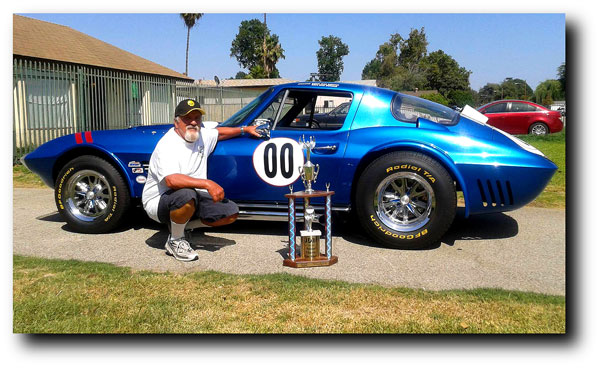
Doug ordered his Grand Sport with the following options; 3LT Adrenaline Red interior (top of the line), Competition seats, black wheels (just like Dave’s 1963 Corvette) with red calipers, blue center stripes, Heritage Package with red fender hash marks, the Phase II rear spoiler, and the Corvette Museum Delivery. The optional interior plaque reads, “In Memory of Dave MacDonald”. Doug later added the front aero winglettes and rear spoiler wickerbill. He also changed the car’s red taillight to clear taillights.
Doug’s Museum Delivery was also special. Doug and his lady, Sherry Sablan, dealership salesman Nate Chandler and his wife, all attended the Museum Delivery. All of the proper photos and certifications were fulfilled, the event was documented and posted on Facebook and lastly, Doug and Sherry drove the car home to California, just like Dave and Sherry MacDonald had done in September 1962!
It took Doug months of living with the car and looking at it to come up with a plan to complete his tribute. Doug wanted to replicate the 1963 racecar’s “white with blue stripes and trim” look on a very different body shape. Doug started with the basic Grand Sport center stripe and had the stripe extended forward, past the hood air extractor, and onto the front bumper cover to better match the look on the 1963 car. Doug’s fender stripes hit the mark perfectly by starting at the inside line of the headlights and flowing back, intersecting perfectly with the red fender hash marks, then flowing and thinning back towards the A-pillar. The rear fender strips just kiss the tops of the rear fender creases, splitting the space between the edge of the fender crease and the rear fender scoops, and flowing back. And at the back edge of the rear glass in white lettering, it says, “IN LOVING MEMORY OF 2014 CORVETTE HALL OF FAME LEGEND DAVE MACDONALD WWW.DAVEMACDONALD.NET”.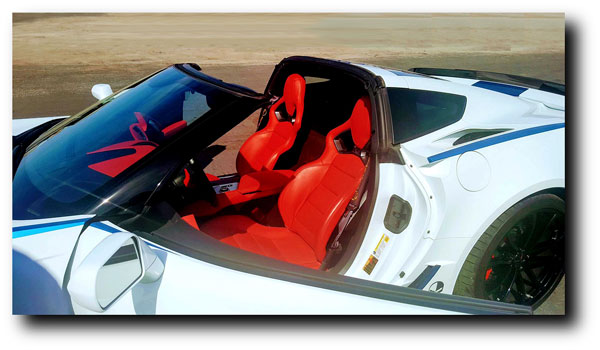
Doug MacDonald is absolutely delighted with his C7 Grand Sport Corvette tribute car. “I love everything about the car! The car’s looks, stance, the interior is gorgeous, the Competition Seats are excellent and I even like the automatic transmission, it shifts hard and quick. I’m sure Dave would love this car!”
I’m sure that Doug isn’t completely done with his tribute car. There’s a possibility he might have “stick on/peal off” vinyl “DON STEVES CHEVROLET” AND “00” in a round blue meatball made for the doors and hood, for when he displays the car at shows. But mostly, Doug and Sherry’s plans are to get into their 2017 Grand Sport and drive, drive, drive, and enjoy, enjoy, enjoy – just the way Dr. Duntov wanted all of his Corvette customers to do. – Scott
